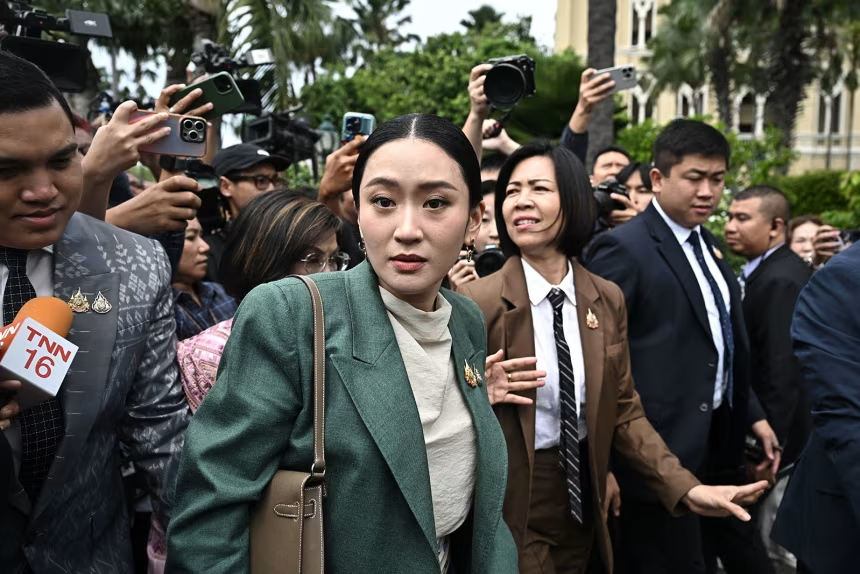
Bangkok, Thailand — A Thai court removed suspended Prime Minister Paetongtarn Shinawatra from office on Friday, ruling that her controversial phone call with Cambodia’s former leader breached ethics rules, in a move that plunges the kingdom into fresh political turmoil.
Paetongtarn, a member of the powerful Shinawatra political family dynasty, became the country’s youngest prime minister in August 2024 and has served only a year in office.
In the leaked call, which took place on June 15 as border tensions with Cambodia escalated, Paetongtarn could be heard calling former Cambodian prime minister Hun Sen “uncle” and appeared to criticize her own army’s actions in the border clashes that had led to the death of a Cambodian soldier.
Paetongtarn also added that if Hun Sen “wants anything, just tell me, and I will take care of it” — contentious remarks that became the center of the case against her.
Her comments in the leaked audio, which was confirmed as authentic by both sides, struck a nerve in Thailand. Nationalist fervor was already running high over the border dispute, and opponents accused her of compromising the country’s national interests.
Weeks later the two countries engaged in a five-day conflict that killed at least 38 people, mostly civilians, and forced hundreds of thousands to flee their homes.
Paetongtarn apologized to the Thai people “who may feel uneasy or upset about this matter” and said her remarks were a negotiating technique used to diffuse tensions.
On July 1, the court suspended Paetongtarn from prime ministerial duties, though she remained in the Cabinet as culture minister following a reshuffle.
- Lady Chevrons not getting carried away despite blistering run
- Women cricket captain upbeat of WC qualifier
- Foreign investment in China slumps to 18-year low
- Lady Chevrons go down to Thailand in first ODI
Keep Reading
The Constitutional Court’s ruling on Friday represents another wave on the turbulent rapids of Thai politics, in which those pushing for change have frequently run foul of the establishment – a small but powerful clique of military, royalist and business elites.
Last week, Paetongtarn’s father, the influential and divisive former Prime Minister Thaksin Shinawatra, survived a lese majeste case against him that could have seen him jailed for up to 15 years.
Thai court topples governments, dissolves parties
Over the past two decades, dozens of lawmakers have faced bans, parties have been dissolved and prime ministers have been overthrown in coups or by court decisions – with the judiciary playing a central role in the ongoing battle for power.
In the past three years alone, the kingdom has seen two prime ministers removed from office and an election-winning party dissolved. Before that, former army commander Prayut Chan-o-cha ruled as prime minister for nine years after seizing power in a coup in 2014.
Paetongtarn is the latest in her family to be dismissed as premier – political parties allied to Thaksin have repeatedly won elections but struggled to hold on to power.
Paetongtarn’s aunt Yingluck Shinawatra was removed from office before the military seized power in a 2014 coup, and her father went into self-imposed exile in 2006 for more than 15 years to escape corruption charges after the military toppled his government.
Her uncle Somchai Wongsawat was briefly prime minister in 2008 but was removed in a court ruling.
Paetongtarn herself came to power after her predecessor Srettha Thavisin was removed from office in a shock court ruling last year by the same Constitutional Court.
Srettha had led the Pheu Thai Party in forming a government with its conservative and pro-military rivals following the 2023 election. The uneasy coalition was forged to prevent the progressive Move Forward Party, which won the most votes, from taking office after it promised deep-seated reforms to Thai ruling institutions, including the monarchy.
With Pheu Thai in power again, Thaksin — who continued to play an outsized role in politics behind the scenes despite his absence — was allowed to return to his home country.
What happens next?The verdict against Paetongtarn could spell trouble for the powerful Shinawatra family’s political fortunes.
The clan have dominated Thai politics for more than 20 years, but the government is now on shaky ground. Internal conflict in the ruling coalition and the delayed rollout of flagship policies has dented its ability to govern at a time when the economy is faltering. The leaked phone call plummeted the party’s already declining popularity.
Pheu Thai must now nominate a new candidate for prime minister, which will be voted on by the 500-seat parliament. Their last remaining choice is former justice minister Chaikasem Nitisiri, though it is unclear whether he would get the necessary votes from the party’s coalition partners.
Bhumjaithai Party leader Anutin Charnvirakul, who would be another candidate for prime minister, quit the coalition and resigned as deputy prime minister and interior minister over Paetongtarn’s leaked phone call.
If the party fails to put forward a new prime minister, it raises the prospect of new elections, with Pheu Thai in a much weaker position.
Some analysts say the establishment would still favor the Thaksin-backed party as it would act as a firewall against the main opposition People’s Party, which is seen as a major disrupter to the Thai establishment with its reformist agenda and high approval ratings.







